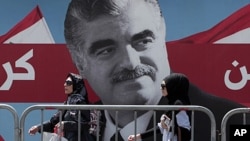The United Nations Special Tribunal for Lebanon has presented arrest warrants and indictments for four men, believed to be affiliated with Hezbollah, for their alleged roles in the assassination of former Lebanese Prime Minister Rafik Hariri six years ago.
|
VOA's Susan Yackee speaks with Nadim Houry, with Human Rights Watch in Beirut, about the development: |
Tribunal officials delivered the indictments and warrants Thursday to Lebanon’s state prosecutor in Beirut. The prosecutor now has 30 days to take action, and if he does not, the Tribunal can publish the documents.
In a televised speech, Lebanese Prime Minister Najib Mikati asked for calm in what he called a “sensitive time” for his country.
Call to unite
Mikati called on the Lebanese people to unite in “a new reality,” and to make learning the truth a priority, “in spite of anything.”
He said the indictments should be dealt with “realistically and responsibly.” And he also cautioned that indictments are not convictions, and that all those accused are innocent until proven guilty.
The U.N. Tribunal has long been expected to indict members of Hezbollah, which has denied any involvement in the truck bombing that killed Hariri and 22 other people in 2005.
Hezbollah is the most powerful political movement in Lebanon, and it forced the fall of the government led by Hariri’s son, Saad, in January, when the Tribunal first moved to issue indictments. Hezbollah and its allies hold a majority of seats in the current Lebanese Cabinet. Western nations consider Hezbollah a terrorist organization, and say it is heavily influenced by Syria and Iran.
Concerns of reprisals
Some news reports suggest the indictments could spark new attacks by Hezbollah and plunge Lebanon into a new and deeper political crisis.
Nadim Shehadi of London’s Royal Institute of International Affairs said there is concern about violence, but he disagrees with predictions of chaos in Lebanese politics and society.
“The impact will be minimal because this is something that has been expected and anticipated for the last two, three years," said Shehadi. "And all the crises that Lebanon has gone through were related to it. So, it’s like the moment of impact has been amortized.”
Shehadi said that until recently, many Lebanese saw the U.N. Tribunal as interference in their country’s internal affairs, and might have reacted angrily to these indictments. But he said things have changed in Lebanon, as they have elsewhere in the region, with concepts like ‘accountability’ and ‘justice’ taking on new meaning and importance.
“It involves, for the first time in the whole region, the introduction of accountability to such crimes," said Shehadi. "So you are really changing the modus operandi of the whole region with this. The idea of international justice and accountability is much more accepted in the region because of what happened in Tunis, in Egypt. There is a change in atmosphere, and this is part of the change.”
Syria's role
But Shehadi acknowledges it is a long way from Thursday’s sealed indictments to actual punishment for Hariri’s killers. He said the process will take a long time, and will be opposed by Syria, which has considerable influence in Lebanon.
He said Syrian leaders are concerned about any development that promotes accountability and might lend credibility to their country’s opposition movement, which is facing a violent crackdown by Syrian government forces.




